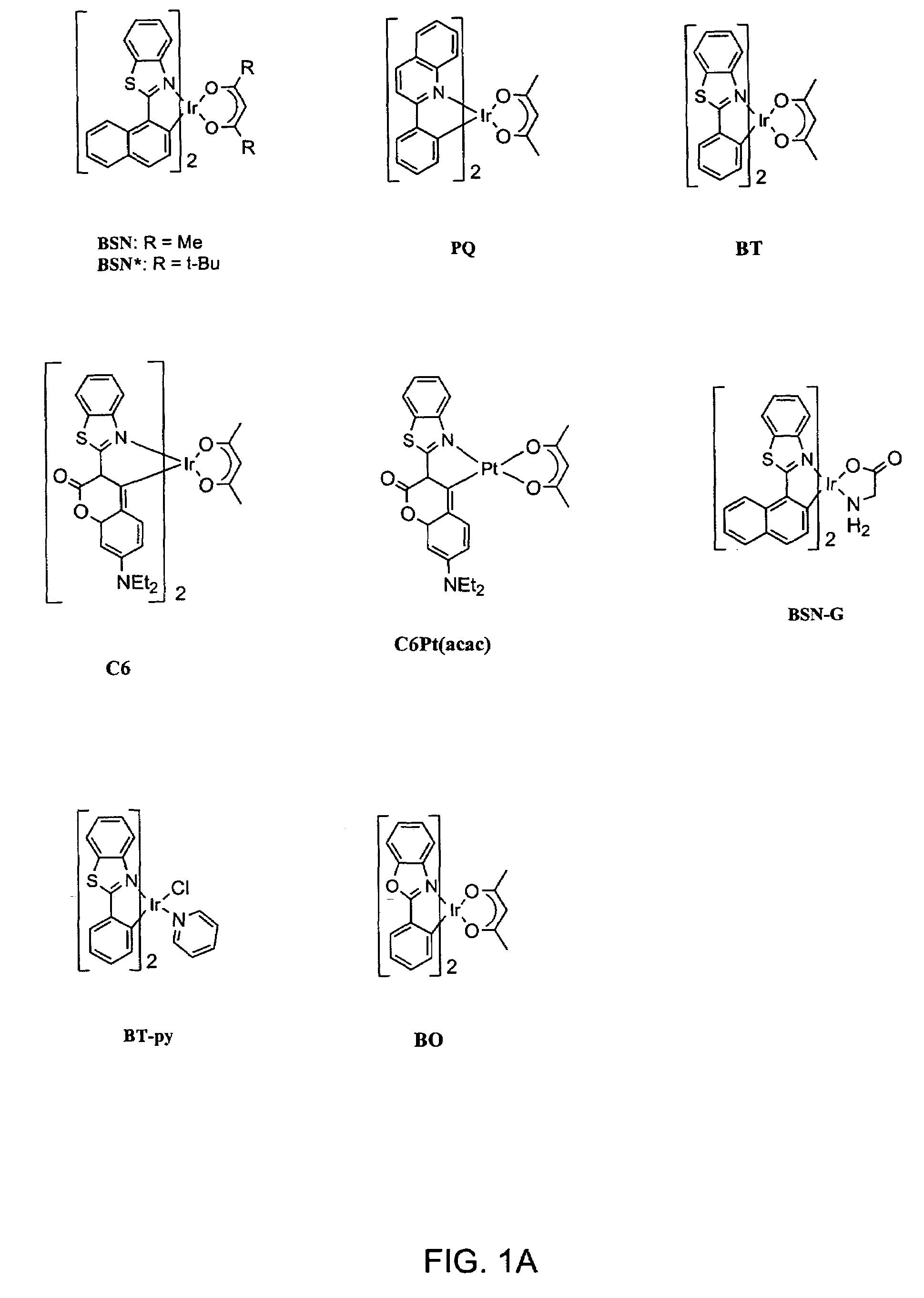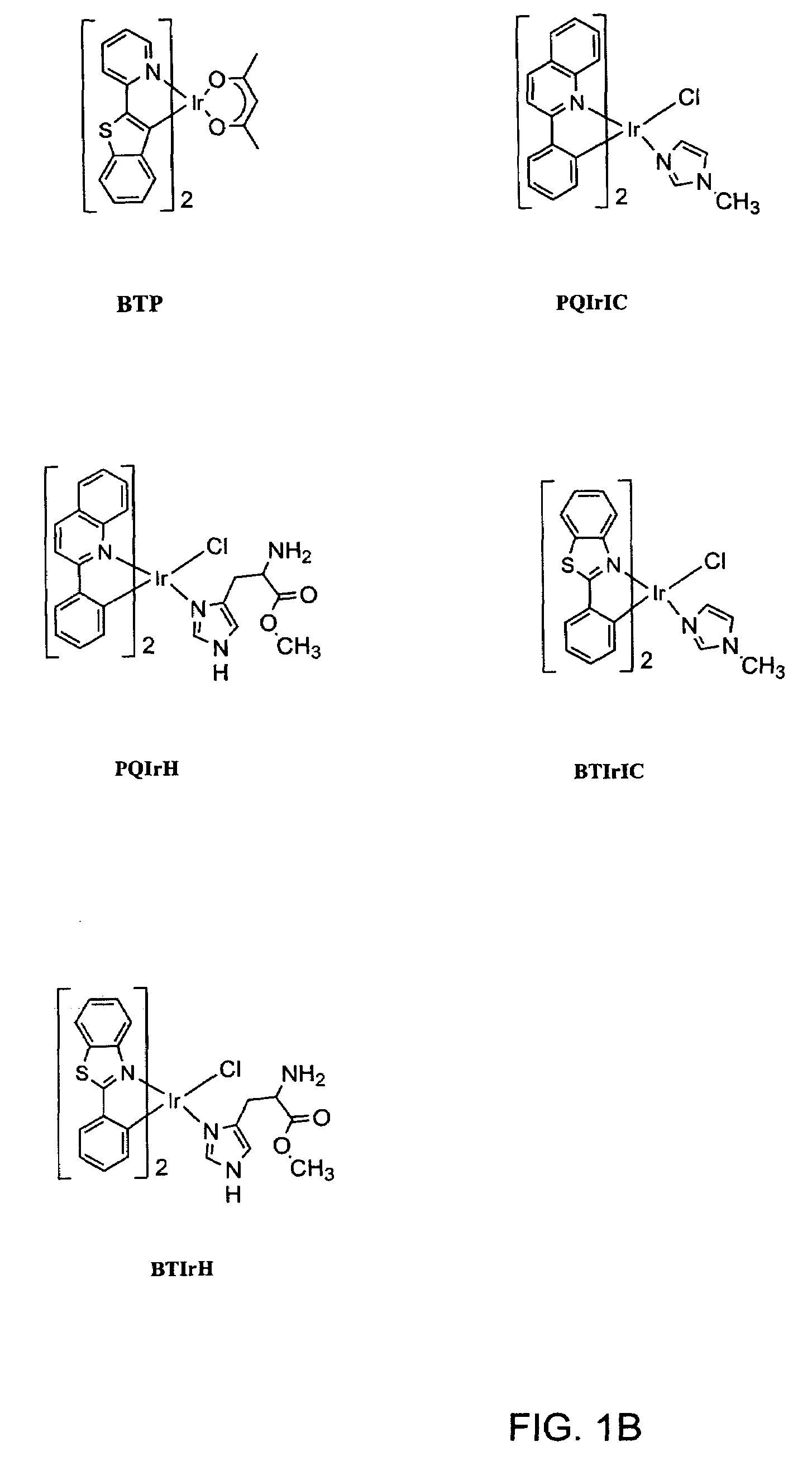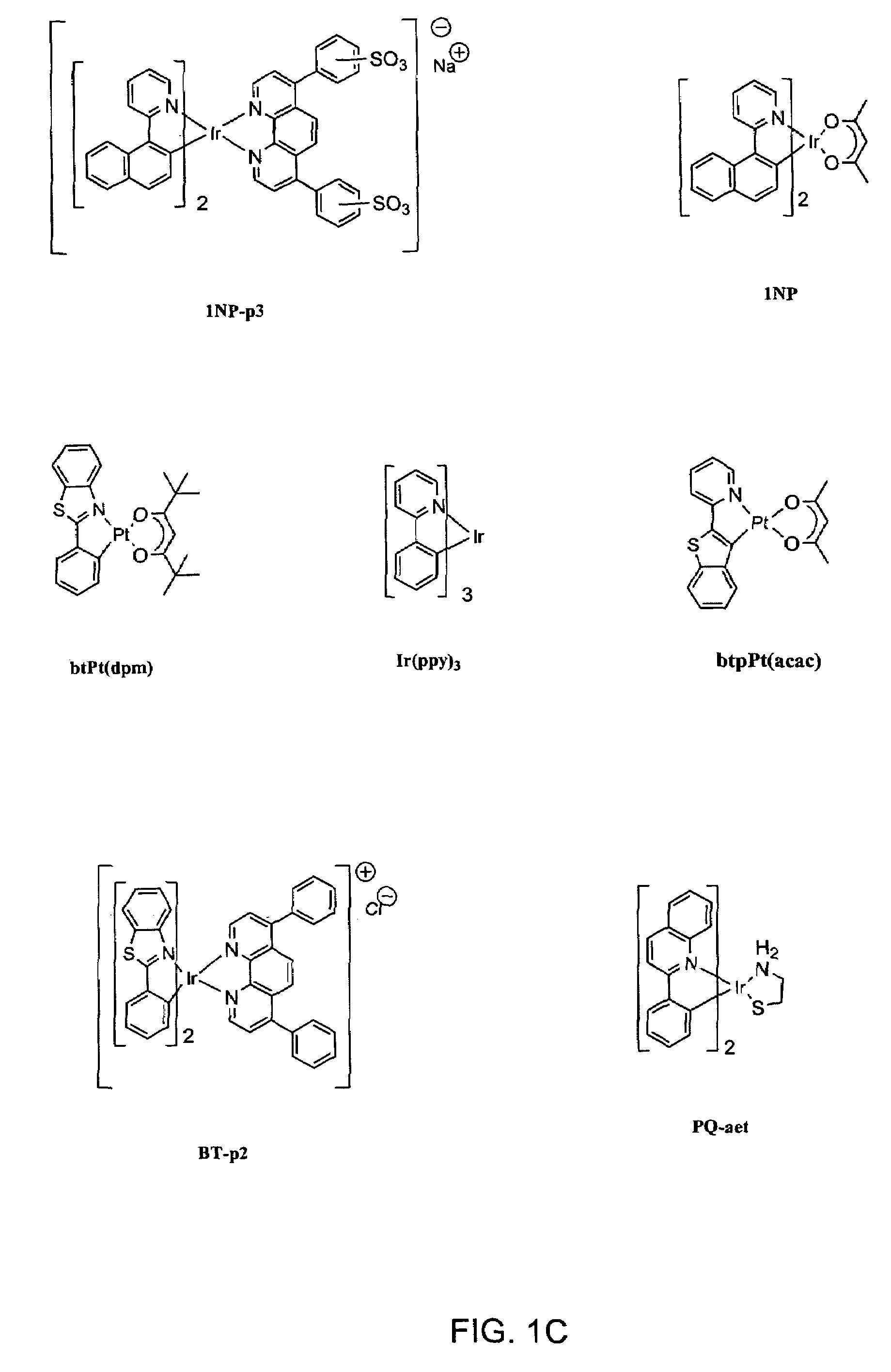Organometallic complexes as singlet oxygen sensitizers
a technology of organic complexes and oxygen sensitizers, applied in the field of organic complexes, can solve the problems of not giving detectable triplet emission, evidence of significant intersystem crossing, singlet/triple ratio thus implying a limitation of 25% for the internal quantum efficiency of oleds based on fluorescence, and achieve the effect of improving lifetim
- Summary
- Abstract
- Description
- Claims
- Application Information
AI Technical Summary
Problems solved by technology
Method used
Image
Examples
example 1
Synthesis of (C^N)2IrLX Complexes: General Procedure
[0077]The general synthesis of complexes-having acac as the L^Y ligand will be describe. Cyclometallated Ir(III)μ-chloro-bridged dimers of a general formula (C^N)2Ir(μ−Cl)2(C^N)2 were synthesized according to the Nonoyama route, by refluxing IrCl3.(nH2O) with 2-2.5 equivalents of cyclometalating ligand in a 3:1 mixture of 2-ethoxyethanol and water (Bull. Chem. Soc. Jpn. 1974, 47:767-768).
[0078]The chloro-bridged dimer complex (0.08 mmol), 0.2 mmol of acetyl acetonate and 85-90 mg of sodium carbonate are refluxed in an inert atmosphere in 2-ethoxyethanol for 12-15 hours. After cooling to room temperature, the precipitate is filtered off and washed with water, hexane, and ether. The crude product is flash chromatographed on a silica column with dichloromethane mobile phase to provide the (C^N)2IrL^X complex.
example 2
Synthesis of iridium(III) bis(2-phenylbenzothiazolato-N, C2)pyridyl chloride [BT-yl]
[0079][(bt)2IrCl]2 (0.3 mmol) and excess pyridine were refluxed under a nitrogen atmosphere in dichloromethane (22 mL) for 90 minutes. The clear, orange-yellow solution was allowed to cool to room temperature, and the solvent was removed in vacuo. The resulting solids were washed with cyclohexane (6×15 mL), separated from the washings by filtration, and dried overnight under vacuum.
[0080]1H-NMR (250 MHz, C6D6), ppm: 10.96 (d, J=8.4 Hz, 1H), 10.80 (s broad, 1H), 8.16 (s broad, 1H), 7.53 (dd, J=7.5, 1.5 Hz, 1H), 7.42 (dd, J=7.5, 1.4 Hz, 1H), 7.32 (dd, J=7.2, 1.3 Hz, 1H), 7.29 (dd, J=7.0, 1.4 Hz, 1H), 7.20-7.18 (m, 3H), 6.99-6.77 (m, 7H), 6.67 (ddd, J=7.8, 2.5, 1.4 Hz, 2H), 6.50 (dvt, J=7.5, 1.6 Hz, 1H), 6.43 (s broad, 1H), 5.90 (s broad, 1H).
[0081]Absorbance Spectrum (C6H6), nm (log ε): 291 (6.5), 302 (6.5), 315 (6.5), 328 (6.5), 356 (6.0), 394 (5.8), 442 (5.7), 541 (4.8).
[0082]Emission Spectrum (C6H6;...
example 3
Synthesis of iridium(III) bis(2-(1-naphthyl)benzothiazolato-N,C2)glycinate [BSN-G]
[0084][(bsn)2IrCl]2 (0.11 mmol), glycine (0.32 mmol), and Na2CO3 (0.68 mmol) were refluxed under a nitrogen atmosphere in 2-ethoxyethanol (25 mL) for 125 minutes. The resulting red solution was allowed to cool to room temperature and diluted with methanol. This solution was then extracted with dichloromethane and water (2×). The organic layer was separated, washed with saturated NaCl solution, and dried over Na2 SO4. The solvent was removed in vacuo, and the resulting solids were dried overnight on the vacuum pump. The resulting crude BSN-G was purified by column chromatography twice; first with acetonitrile, then with 9:1 acetonitrile:methanol both on silica gel.
[0085]1H-NMR (500 MHz, DMSO-d6) ppm: 8.54 (d, J=8.3 Hz, 2H), 8.43 (d, J=8.3 Hz, 1H), 8.37 (dd, J=16.6, 8.0 Hz, 2H), 8.16 (d, J=7.6 Hz, 1H), 7.78-7.66 (m, 4H), 7.64 (vt, J=7.4 Hz, 2H), 7.58 (vt, J=7.2 Hz, 1H), 7.50 (vt, J=7.5 Hz, 1H), 7.41 (t, ...
PUM
| Property | Measurement | Unit |
|---|---|---|
| atomic number | aaaaa | aaaaa |
| wavelengths | aaaaa | aaaaa |
| wavelengths | aaaaa | aaaaa |
Abstract
Description
Claims
Application Information
 Login to View More
Login to View More - R&D
- Intellectual Property
- Life Sciences
- Materials
- Tech Scout
- Unparalleled Data Quality
- Higher Quality Content
- 60% Fewer Hallucinations
Browse by: Latest US Patents, China's latest patents, Technical Efficacy Thesaurus, Application Domain, Technology Topic, Popular Technical Reports.
© 2025 PatSnap. All rights reserved.Legal|Privacy policy|Modern Slavery Act Transparency Statement|Sitemap|About US| Contact US: help@patsnap.com



